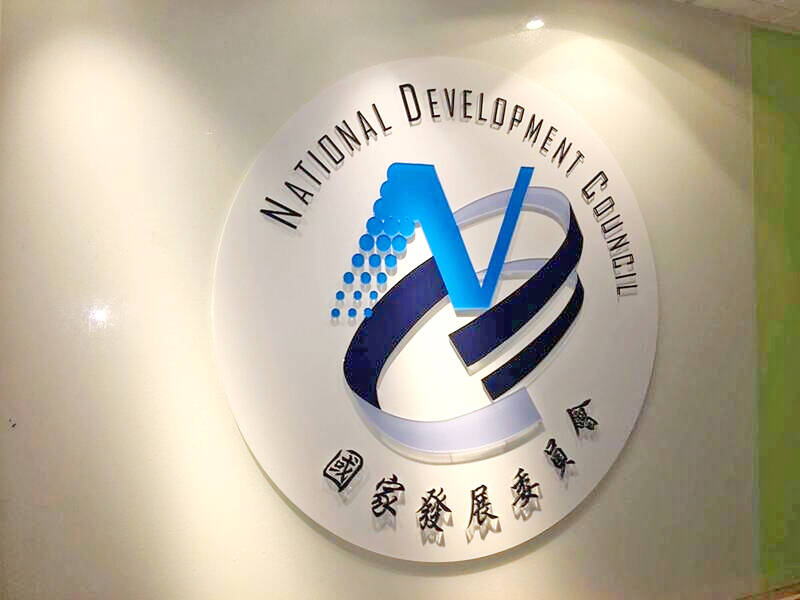Taiwan’s economy outperformed major regional rivals between 2019 and 2022, helped by the government’s introduction of policy measures to attract capital repatriation, improve infrastructure, assist strategic sectors and facilitate industrial upgrades, the National Development Council (NDC) said in a statement yesterday.
The council’s remarks came in response to the campaign office for Chinese Nationalist Party (KMT) presidential candidate and New Taipei City Mayor Hou You-yi (侯友宜), which held a news conference earlier criticizing the nation’s economy as “poor and lagging behind.”
In the statement, the council said Taiwan led the pack during the period by measure of GDP growth among the four Asian Tigers, namely Hong Kong, Singapore, South Korea and Taiwan. All four economies have been fueled by export-led growth and rapid industrialization since the 1960s.

Photo: Wu Hsin-tien, Taipei Times
In addition, the TAIEX last year put up a stronger showing than the Hong Kong bourse, which has been hit hard by capital outflows, the council said. By contrast, the local bourse reported massive capital inflows in November and last month, consistent with recovery expectations on the part of global funds for technology products, Taiwan Stock Exchange data showed.
Taiwan in 2022 became the world’s 21st-largest economy with annual per capita income surpassing US$30,000, making it the 10th-best performer among nations with a population of more than 21 million and the second-strongest judging by purchasing power parity, the council said.
The government lent support by rolling out the Invest Taiwan program that allowed local firms based in China to shift manufacturing facilities home with favorable investment terms to dodge the US-China trade disputes, it said.
Further, the government provided aid to the “five plus two” industries that help advance policy initiatives regarding an “Asian Silicon Valley,” biomedical technology, green energy, robotics, defense and aviation, innovative agriculture and a circular economy, the council said.
In addition, the government poured money into infrastructure projects to help narrow development gaps in the north, central and south of Taiwan, it said.
Taiwan also fared well during the COVID-19 pandemic as manufacturers maintained normal operations and supplied the world’s smartphones, tablets, wearables, TVs and cars, the council said.
Over the past eight years, Taiwan’s GDP growth averaged 3.1 percent, better than Singapore, South Korea and Hong Kong, it said.
The same period saw cumulated foreign investment amounting to NT$2.49 trillion (US$80.32 billion) with foreign direct investment in 2022 climbing to a 15-year high of US$13.3 billion, it added.
The income gaps between households are widening because family sizes have grown smaller, weighing on their overall income, as Taiwan’s population ages rapidly, the council said.
However, Taiwan’s Gini coefficient, a globally used measure of income inequality, was 0.277 in 2021, milder than 0.333 in South Korea, 0.386 in Singapore and 0.382 in China, it said.

Intel Corp chief executive officer Lip-Bu Tan (陳立武) is expected to meet with Taiwanese suppliers next month in conjunction with the opening of the Computex Taipei trade show, supply chain sources said on Monday. The visit, the first for Tan to Taiwan since assuming his new post last month, would be aimed at enhancing Intel’s ties with suppliers in Taiwan as he attempts to help turn around the struggling US chipmaker, the sources said. Tan is to hold a banquet to celebrate Intel’s 40-year presence in Taiwan before Computex opens on May 20 and invite dozens of Taiwanese suppliers to exchange views

Application-specific integrated circuit designer Faraday Technology Corp (智原) yesterday said that although revenue this quarter would decline 30 percent from last quarter, it retained its full-year forecast of revenue growth of 100 percent. The company attributed the quarterly drop to a slowdown in customers’ production of chips using Faraday’s advanced packaging technology. The company is still confident about its revenue growth this year, given its strong “design-win” — or the projects it won to help customers design their chips, Faraday president Steve Wang (王國雍) told an online earnings conference. “The design-win this year is better than we expected. We believe we will win

Chizuko Kimura has become the first female sushi chef in the world to win a Michelin star, fulfilling a promise she made to her dying husband to continue his legacy. The 54-year-old Japanese chef regained the Michelin star her late husband, Shunei Kimura, won three years ago for their Sushi Shunei restaurant in Paris. For Shunei Kimura, the star was a dream come true. However, the joy was short-lived. He died from cancer just three months later in June 2022. He was 65. The following year, the restaurant in the heart of Montmartre lost its star rating. Chizuko Kimura insisted that the new star is still down

While China’s leaders use their economic and political might to fight US President Donald Trump’s trade war “to the end,” its army of social media soldiers are embarking on a more humorous campaign online. Trump’s tariff blitz has seen Washington and Beijing impose eye-watering duties on imports from the other, fanning a standoff between the economic superpowers that has sparked global recession fears and sent markets into a tailspin. Trump says his policy is a response to years of being “ripped off” by other countries and aims to bring manufacturing to the US, forcing companies to employ US workers. However, China’s online warriors